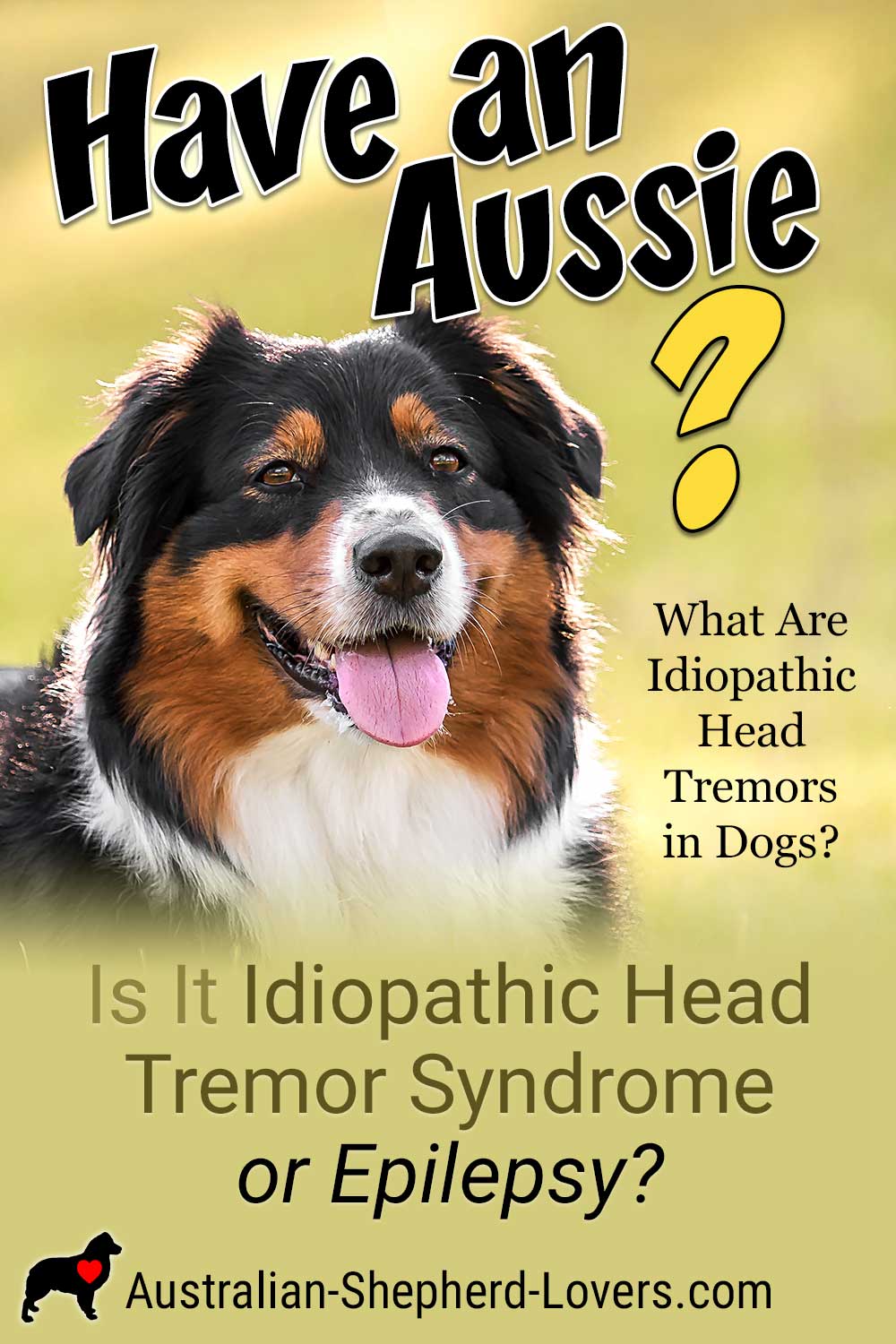
Idiopathic Head Tremors in Dogs Can Be Mistaken for Epilepsy
Iiopathic head tremors in dogs, also known as idiopathic head tremor syndrome (IHTS), is a benign condition that actually looks more frightening than it really is. It can be disturbing to see your dog suddenly exhibiting an uncontrollable shaking of the head but there is no cause for panic. As with most conditions, the important thing is to get a proper diagnosis from your vet so that you know you aren't dealing with anything more serious like idiopathic epilepsy, a condition known to affect Australian Shepherds.
So what exactly is idiopathic head tremor in dogs? As noted above, it is a condition that causes episodes of head shaking in either a rotational, up-down or side to side direction.
Each episode usually only lasts a few minutes, though in isolated cases the tremors can continue for up to an hour. The word "idiopathic" indicates that the underlying cause of the condition is unknown.
While there is no specific known cause, several theories exist about contributing factors, including low glucose and/or calcium levels in the blood, or hormonal imbalance. Hormones are a suspected contributor due to the increased incidence of idiopathic head tremors in dogs during estrus.
Another suspected cause of idiopathic head tremor syndrome is abnormalities of the stretch reflex mechanisms in the neck, which can result in alternating contraction and relaxation of the neck muscles, which manifests as a tremor. What we know for sure is that there is no underlying disease or illness affecting the brain, such as epilepsy.
We know this because dogs diagnosed with IHTS will have normal results in all of the usual clinical tests run by veterinarians. Of course, it is still important for your dog to have a full exam and receive a proper diagnosis to rule out any more serious conditions, so if he is exhibiting head tremors you should get him to the vet as soon as possible.
Other Indications Your Dog Has IHTS
Aside from clinical testing, the one clear way to identify idiopathic head tremors in dogs is that, unlike actual seizures, dogs suffering from IHTS do not lose consciousness and remain alert throughout each episode. In fact, in most cases of IHTS symptoms can be relieved by distracting your dog, either by offering treats or simply addressing him by name.
Since there is no underlying clinical cause for idiopathic head tremor in dogs, there are no medical treatments available. Anti-seizure medications and other medical treatments have had no effect on IHTS whatsoever and distraction remains the best response to symptoms.
While idiopathic head tremor syndrome can affect any breed, it is most common in Bulldogs and Doberman Pinschers. Regardless of breed, most dogs that develop IHTS will begin to exhibit tremors between six months and three years of age, although it can also appear in dogs as old as 12.
The frequency of episodes can also vary from one dog to another, with the majority experiencing tremors anywhere from a few times a week to many times per day. In other cases idiopathic head tremors in dogs are much less frequent, occurring only once every 3-4 months.
Does Your Australian Shepherd Have Idiopathic Head Tremor Syndrome or Epilepsy?
There is no doubt that idiopathic head tremor syndrome can be distressing to see, but once properly diagnosed it is not cause for alarm. It is particularly important for Australian Shepherd owners to be alert to symptoms as Aussies can have a natural inclination toward a more serious illness, idiopathic epilepsy, which can also cause tremors. If you should notice your Aussie experiencing tremors, you should get him to the vet for a full exam and diagnosis as quickly as possible.
It's crucial to distinguish between the two as idiopathic epilepsy generally requires medication for proper treatment. Your vet can perform a series of tests, including blood tests, biochemistry, urinalysis, liver function analysis and thyroid hormone testing, cervical and brain MRI, all of which can help to establish a diagnosis of idiopathic epilepsy. If the results all come up normal, then your vet is likely to diagnose idiopathic head tremor syndrome.
Though it can be troubling to experience, the encouraging news is that idiopathic head tremor in dogs is benign and does not lead to any more serious neurological or other health conditions. Many dogs who suffer from IHTS will experience a spontaneous improvement in the severity or frequency of symptoms over time and they will often go away entirely.
Idiopathic Head Tremors in Dogs Can Often Be Stopped by Using Distraction to Pull Them Out of an Episode
Dogs with IHTS are usually otherwise healthy and will suffer no lingering effects from their episodes of tremors, though they might become frightened or agitated during an episode. Drawing them out of an episode by distracting them can help to both alleviate symptoms and calm them down. In any case, it's important for you as an owner to understand what is happening so that you don't overreact to a case of idiopathic head tremors in dogs.
Remember that your four legged friend is very good at reading your emotional reactions and will react in kind, so the more upset you get, the more upset he'll get. Simply remain calm, talk to him normally and do what you can to distract him when the tremors start. You may just have to call his name or you may want to offer a favorite toy or treat.
Because idiopathic head tremors in dogs are often connected to spasms in the neck mechanism, by distracting your dog you can get him to move his head and that simple change in position can be all that is required to stop the shaking. As scary as it may seem, you and your dog can weather his bout of IHTS with the right approach and soon he'll likely be back to his old self again.
For more information about Aussie health issues see the Australian Shepherd Health & Genetics Institute (ASHGI).
Have Dog Training Questions?
Check out these introductory dog training videos...
I want my dog to stop being aggressive.
I want some help training my new puppy.
I want my dog to stop barking at everything.
Get Australian Shepherd Info, Website Updates, Special Offers, and Cartoons...
FREE GIFT
You'll also receive a free copy of the ebook
My Everyday Dog Training Tools
by professional dog trainer Daniel Abdelnoor, "Doggy Dan"













 Loading Image...
Loading Image...